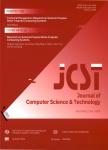A Unified Shared-Private Network with Denoising for Dialogue State Tracking
有为追踪的对话状态降噪的一个统一份额私人的网络作者机构:National Laboratory of Pattern RecognitionInstitute of AutomationChinese Academy of SciencesBeijing 100190China School of Artificial IntelligenceUniversity of Chinese Academy of SciencesBeijing 100049China Beijing Unisound Information Technology Co.LtdBeijing 100096China
出 版 物:《Journal of Computer Science & Technology》 (计算机科学技术学报(英文版))
年 卷 期:2021年第36卷第6期
页 面:1407-1419页
核心收录:
学科分类:12[管理学] 1201[管理学-管理科学与工程(可授管理学、工学学位)] 081104[工学-模式识别与智能系统] 08[工学] 0835[工学-软件工程] 0811[工学-控制科学与工程] 0812[工学-计算机科学与技术(可授工学、理学学位)]
基 金:supported by the National Natural Science Foundation of China under Grant Nos.61533018,U1936207,61976211,and 61702512 the Independent Research Project of National Laboratory of Pattern Recognition under Grant No.Z-2018013 the National Key Research and Development Program of China under Grant No.2020AAA0106400 the Youth Innovation Promotion Association of Chinese Academy of Sciences under Grant No.201912
主 题:dialogue state tracking unified strategy shared-private network reinforcement learning
摘 要:Dialogue state tracking(DST)leverages dialogue information to predict dialogues states which are generally represented as slot-value ***,previous work usually has limitations to efficiently predict values due to the lack of a powerful strategy for generating values from both the dialogue history and the predefined *** predicting values from the predefined value set,previous discriminative DST methods are difficult to handle unknown *** generative DST methods determine values based on mentions in the dialogue history,which makes it difficult for them to handle uncovered and non-pointable ***,existing generative DST methods usually ignore the unlabeled instances and suffer from the label noise problem,which limits the generation of mentions and eventually hurts *** this paper,we propose a unified shared-private network(USPN)to generate values from both the dialogue history and the predefined values through a unified ***,USPN uses an encoder to construct a complete generative space for each slot and to discern shared information between slots through a shared-private ***,our model predicts values from the generative space through a shared-private *** further utilize reinforcement learning to alleviate the label noise problem by learning indirect supervision from semantic relations between conversational words and predefined slot-value *** results on three public datasets show the effectiveness of USPN by outperforming state-of-the-art baselines in both supervised and unsupervised DST tasks.



